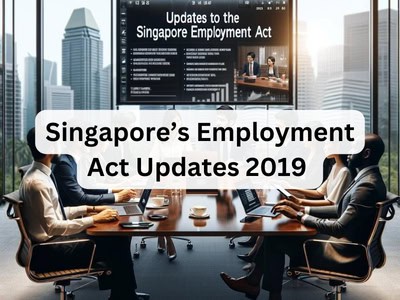This post is also available in:
![]() 简体中文 (Chinese (Simplified))
简体中文 (Chinese (Simplified))
Singapore’s Employment Act Updates 2019
 Singapore Employment Act Updates – Changes to Singapore Employment Act is set to take effect from 1 April 2019
Singapore Employment Act Updates – Changes to Singapore Employment Act is set to take effect from 1 April 2019
Singapore’s local and foreign employees under a contract of service with an employer are covered under the Employment Act. This law was enforced in 1968 and was put in place to protect the rights of both employers and employees. Since then, the Act has undergone several changes. It is essential that both employers and business owners understand and are aware of these changes and their impact on their employees and businesses.
The Effect of Changes
The following are key amendments for employers to take note of:
- Extension of Core Provisions to All Managers and Executives – Previously core provisions cover all employees except managers and executives earning more than $4,500. These include the minimum days of annual leave, paid public holiday and sick leave entitlements, as well as other protections for timely salary payment ad wrongful dismissals. With effect 1 April 2019, this threshold will be removed. All employees, (managers, executives, workmen and non-workmen) will be covered by the core provisions under the Employment Act. Seafarers, domestic workers and public servants will continue to be excluded, due to the nature of work and are separately covered by other regulations.
- Salary Threshold for Non-Workmen – in addition to core provisions, the Act provides additional protections in Part IV of the Act on hours of work, rest day and overtime pay. Previously, Part IV covers workmen earning up to $4,500 and non-workmen earning up to $2,500. The government has now increased the salary threshold from $2,500 to $2,600 enlarging Part IV employees to half of Singapore’s workforce. The salary cap of $2,250 will also be increased to $2600 for calculating overtime pay.
- Wrongful Dismissal Claims – As of April 2019, Ministry of Manpower will no longer hear wrongful dismissals claims under the Employment Act and Child Development Co-savings Act. Such claims will be heard by the Employment Claims Tribunal (ECT), following mediation by the Tripartite Alliance for Dispute Management (TADM). This change provides one-stop service to employees with both salary-related and wrongful dismissal claims. Previously, employees who had both claims had to seek recourse separately. While employers and employees have the right to contractual termination, employees can still submit a dismissal claim if they can substantiate that their dismissal is wrongful. This includes employees who feel that they were forced to resign for wrongful reasons. For managers and executives, the minimum service period they must fulfil before they can submit a dismissal claim (for dismissals with notice) will be reduced from 1 year to 6 months. There is no change for non-managers and executives for whom no minimum service period is required.
- A Less Prescriptive Approach for Authorised Deductions – At present, deductions cannot be made from an employee’s salary other than what has been outlined in the Employment Act. With effect from April 2019, the Act will be amended to allow deductions if employee willingly consent to the deduction in writing and with the condition that the employee can withdraw his consent any time, without penalty. This arrangement will provide employees with the flexibility to cater towards deductions not included in the Employment Act while safeguarding the salary of the employees through the consent.
- Medical Certificates (MCs) and Hospitalisation Leave – Currently, employers are required under the Act to recognize MCs only if they are issued by Government and company-appointed doctors. Going forward, employers will need to recognize MCs from all registered doctors for the purpose of granting paid sick leave. However, there is no change to the policy on reimbursement of medical consultation fees. Employers are only required to reimburse fees for consultation with government doctors or company approved doctors, if the consultation is linked to the paid sick leave. For hospitalization leave, only MCs issued by hospital doctors will be recognized. Employers who wish to recognize hospitalization MCs from their own panel doctors can continue to do so.


